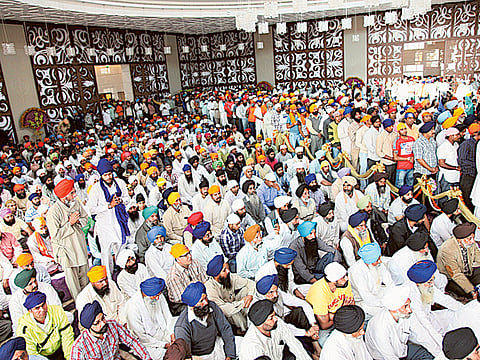Shining example of tolerance
With 28 churches, 2 Hindu temples and 2 Sikh temples in UAE, diverse expatriate community feels at home

Dubai: With the UAE’s population topping 9.3 million, the growing melting pot of nationalities and mixing of cultures has been welcomed with religious diversity being no exception.
Residents and religious scholars across the country have continuously praised the UAE’s religious freedom and tolerance for its expatriate residents. The UAE has more than 5,000 mosques in its seven emirates as Islam is the country’s official religion.
However, over the years there has been an increase in the number of churches and Christian worship centres as well as Hindu and Sikh temples in the seven emirates.
Currently, the UAE has 28 churches, two Hindu temples and two Sikh temples.
The churches and worship centres are located in Dubai, Jebel Ali, Sharjah, Ras Al Khaimah and Fujairah.
Religious freedom has been a constant in the UAE and is included in the UAE’s constitution. Article 32 of the constitution states: “Freedom to exercise religious worship is guaranteed in accordance with established customs and provided it does not conflict with public policy or violate public morals”.
Reverend Dr Ruwan Palapathwala of the Anglican Church referred back to the first church founded in the UAE in 1969. The Holy Trinity Church, a multi-denomination Christian church compound located on Oud Metha Road, Dubai, was built on land granted by Shaikh Rashid Bin Saeed Al Maktoum, then Vice-President and Prime Minister of the UAE and Ruler of Dubai.
Reverend Palapathwala explained with 375 congregations, the Protestant church now has branches in other areas of Dubai as well as other emirates. “There are 121 congregations that meet up at the church compound alone and approximately 40,000 Christians visit the church a week,” he said.
‘Supported’
Approximately 85,000 Christians meet at Anglican branches across the country.
Throughout his four years in Dubai, Reverend Palapathwala told Gulf News that he feels privileged to lead the Christian community at the church as the senior chaplain and feels the freedom as a Christian resident in Dubai to openly practise his religion. He said that the church works closely with government departments and other organisations to ensure that all branches are compliant with the law.
“We have experienced complete religious freedom and tolerance in the UAE and we feel supported by the government departments as we have a relationship of respect and understanding with one another,” said Reverend Palapathwala.
Formal religious occasions and celebrations are openly acknowledged in the UAE as Christians gather in church for worship, singing hymns, holy communion, and mass on a weekly basis. Religious occasions are openly celebrated within the Christian community.
“We also have around 500 weddings a year including Christian couples from all denominations, and we also hold burials and funeral functions at the churches and centre,” said Reverend Palapathwala.
The reverend explained that it’s every Christian’s responsibility in the UAE to honour the covenant between the churches and the government by respecting the laws of the country.
“In doing so, we coexist, live in harmony and peace and contribute in the building of this great nation.”
Land grant
The Hindu and Sikh community was also given a place for worship in Dubai after the UAE Government donated land to the community to build a gurdwara (place of worship for the Sikh community) in Jebel Ali. “The Sikh community was very touched when Shaikh Nahyan Bin Mubarak Al Nahyan, Minister of Culture, Youth and Community Development, visited the Jebel Ali Gurdwara twice and congratulated us on nurturing a place where members of all religions can gather for spiritual peace and harmony,” said Kulwant Singh Oberoi, president of the Indian Business Professional’s Council (IBPC) and CEO and MD of the Lama Group.
He described the temple complex as a majestic stand-alone structure where the Sikh community holds the birth anniversaries of all Sikh founders and teachers such as Guru Nanak, Guru Tegh Bahadur, and where they hold free community meal programmes (langar) where anyone and everyone can enjoy a good meal.
Oberoi pointed out that the UAE is the only country in the Gulf Cooperation Council that has allowed the construction of a Sikh place of worship.
“For us Sikhs, we find Dubai to be an upgraded version of India with all temples, churches, mosques and gurdwaras giving expatriates the freedom to practise their religion,” said Oberoi.



